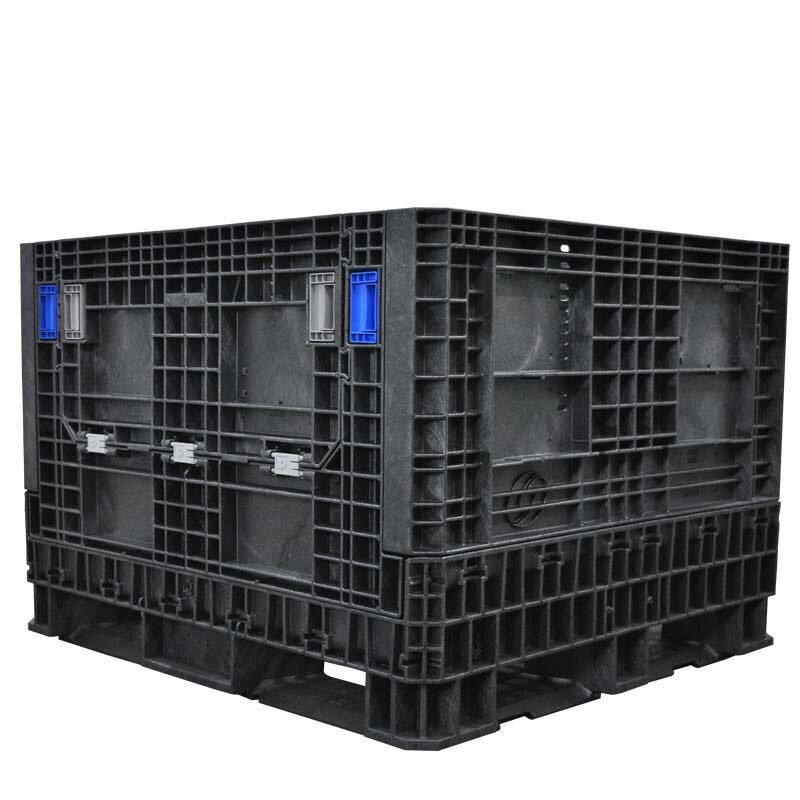How Bulk Plastic Containers can simplify your inventory management system
Wiki Article
The Role of Mass Plastic Containers in Effective Recycling Practices and Sustainability
Bulk plastic containers are indispensable to modern-day recycling efforts. Their style enhances the effectiveness of material collection and transportation, adding to sustainability goals. These containers not just maximize room but additionally help in keeping an eye on contamination degrees. However, their implementation is not without difficulties. Comprehending the complete scope of their effect reveals an intricate relationship between logistics and environmental responsibility that requires further expedition.Comprehending Bulk Plastic Containers
Bulk plastic containers function as an essential component in different markets, facilitating the storage and transportation of items. These containers are usually made from robust products such as high-density polyethylene (HDPE) or polypropylene, which give durability and resistance to ecological variables. Their layout commonly includes features like stackability and modularity, permitting for effective use room throughout both storage and transit.Industries such as farming, food handling, and making regularly utilize bulk plastic containers due to their lightweight nature and simplicity of handling. The containers can be found in different dimensions and configurations, dealing with the details requirements of different products. Their flexibility extends beyond simple functionality; they can additionally be personalized with covers, handles, and classifying alternatives to enhance functionality - Bulk Plastic Containers. Consequently, mass plastic containers play an essential function in optimizing logistics and supply chain procedures throughout several sectors, thus adding to total performance and cost-effectiveness
Advantages of Making Use Of Mass Plastic Containers in Recycling
When organizations prioritize reusing efforts, the usage of mass plastic containers significantly boosts the efficiency of the process. These containers are designed to maximize room, permitting the storage and transportation of larger amounts of recyclable products. This results in less journeys to recycling centers, thus lowering fuel usage and connected emissions.Additionally, mass plastic containers are sturdy and resistant to different ecological variables, ensuring that products stay shielded throughout handling and transportation. Their light-weight layout even more adds to lower transport expenses.
In addition, the harmony of these containers facilitates better sorting and processing of recyclable materials, which can boost total recycling prices - Bulk Plastic Containers. Organizations that take on bulk plastic containers additionally demonstrate a dedication to sustainability, favorably influencing their brand name photo. Eventually, these benefits not only streamline reusing methods however additionally add to broader ecological objectives
Just How Bulk Plastic Containers Facilitate Product Collection
Efficient material collection is considerably enhanced by the use bulk plastic containers, as they give a structured and reliable remedy for gathering recyclable things. These containers are created to fit large volumes of products, which streamlines the sorting and storage space procedure. Their stackable style makes best use of space use, making it simpler for facilities to arrange recyclables without clutter.Additionally, bulk plastic containers are sturdy and weather-resistant, enabling outside positioning without degradation. This durability assures that products stay safeguarded till they are accumulated for processing.

The uniformity in size and shape of these containers facilitates standardization across collection points, allowing far better tracking of recyclable quantities. Furthermore, their clear nature permits easy visibility of contents, assisting in the tracking of contamination levels and guaranteeing that just suitable products are accumulated. Generally, mass plastic containers play a vital role in improving the material collection procedure, consequently promoting efficient reusing techniques.
Transport Performance and Environmental Influence
Transportation efficiency plays a vital function in the recycling process, particularly with the optimization of tons capability in mass plastic containers. By optimizing the quantity of product delivered, business can considerably decrease the variety of journeys needed, thereby reducing their carbon impact. This technique not just enhances functional performance but likewise adds to extra lasting environmental methods.
Maximizing Load Ability
Although optimizing load capability is commonly overlooked, it plays a crucial duty in improving transport performance and reducing environmental effect in reusing techniques. By making best use of the quantity that mass plastic containers can hold, reusing procedures can reduce the variety of trips needed for transport. This not only lowers gas usage but likewise reduces the deterioration on vehicles. Effective lots administration allows centers to utilize room successfully, making certain that each transport cycle is as effective as possible. Furthermore, well-optimized lots can lead to better settlements with logistics companies, potentially lowering general expenses. Inevitably, boosting load capability contributes to a more sustainable reusing system by fostering reliable source use and minimizing waste created during transport.Minimizing Carbon Footprint
As reusing procedures undertaking to lessen their ecological influence, lowering the carbon impact related to transportation becomes an important objective. Mass plastic containers play a critical role in attaining this goal by improving tons efficiency and maximizing logistics. Their lightweight yet durable design allows for maximum freight room utilization, reducing the variety of trips needed to transfer products. By combining shipments, browse around this web-site reusing centers can reduce gas usage and greenhouse gas discharges. Furthermore, tactically finding recycling facilities lessens transportation distances, in addition decreasing carbon outcomes. Utilizing fuel-efficient automobiles and alternate energy resources improves overall sustainability. By incorporating these methods, the recycling industry can appreciably decrease its carbon footprint, adding to a more sustainable future.Challenges in the Use of Bulk Plastic Containers

Contamination Problems
Contamination issues stand for a significant obstacle in the efficient use mass plastic containers within reusing practices. These containers frequently accumulate deposits from previous components, resulting in blended products that can hinder the reusing procedure. Pollutants such as food waste, chemicals, or non-recyclable products can endanger the honesty of the entire batch, leading to raised disposal expenses and decreased recycling rates. Furthermore, inappropriate cleaning or sorting can intensify these problems, making it challenging for reusing facilities to process products effectively. The presence of pollutants not only affects the high quality of recycled items but likewise weakens the total sustainability efforts focused on decreasing plastic waste. Resolving these contamination challenges is vital for boosting the efficiency of bulk plastic container recycling.Recycling Framework Limitations
Inefficiency in recycling infrastructure positions substantial difficulties for the effective monitoring of bulk plastic containers. Several recycling facilities do not have the capability to refine huge quantities of these containers effectively, causing raised expenses and hold-ups. Additionally, insufficient sorting modern technologies typically result in contamination, as bulk containers may be blended with other products, complicating the recycling process. Minimal transport alternatives likewise hinder the activity of bulk plastic containers to suitable recycling facilities, resulting in boosted land fill waste. In addition, an absence of standardized methods for bulk container recycling creates confusion amongst businesses and consumers, better complicating initiatives to advertise sustainability. Resolving these framework constraints is important to enhance recycling techniques and maximize the possibility of mass plastic containers in a circular economy.Best Practices for Applying Bulk Plastic Containers
They should prioritize a strategic strategy that boosts performance and lowers contamination dangers when companies consider applying mass plastic containers in their recycling methods. First, picking the suitable container dimension and kind is necessary to suit the quantity of materials being refined. Organizations needs to also develop clear labeling and signage to guide customers on proper disposal techniques, decreasing confusion and errors. Normal training sessions for team can further reinforce these practices, making sure every person recognizes their duties in keeping reusing honesty.
In addition, companies must apply a regular upkeep routine to check and clean containers, avoiding the accumulation of pollutants. Partnering with regional reusing centers can likewise simplify the collection procedure, guaranteeing that products are efficiently refined. Organizations must keep track of and examine their reusing metrics, utilizing this data to refine techniques over time and promote continuous improvement in their sustainability initiatives.
The Future of Bulk Plastic Containers in Lasting Practices
As organizations significantly prioritize sustainability, the role of mass plastic containers in reusing techniques is readied to advance substantially. Technologies in products scientific research are bring about the growth of biodegradable and recyclable options, enhancing the ecological benefits of mass plastic containers. Additionally, the execution of closed-loop systems will certainly allow for simpler collection and repurposing of these containers, reducing waste and source consumption.Technical advancements, such as clever radar, will certainly allow business to monitor the lifecycle of mass containers, improving performance in recycling processes. As consumer need for sustainable practices grows, organizations will likely embrace bulk plastic containers made for reuse and lasting value. Cooperation between federal governments and markets will promote the establishment of standard recycling procedures, ensuring that mass containers are effectively integrated right into broader sustainability initiatives. In general, the future of bulk plastic containers appears encouraging, with significant potential for Your Domain Name contributing to a circular economy.
Often Asked Concerns
Exactly How Are Bulk Plastic Containers Made and What Materials Are Utilized?
Mass plastic containers are typically made from high-density polyethylene (HDPE) or polypropylene (PP) These materials are processed via injection molding or blow molding techniques, leading to sturdy, lightweight containers ideal for numerous storage space and transportation needs.
Can Bulk Plastic Containers Be Reused Numerous Times Before Recycling?
Yes, bulk plastic containers can be reused multiple times before recycling. Their longevity and design allow for duplicated usage in different applications, promoting sustainability and resource efficiency while reducing the requirement for new containers.
What Certifications Exist for Mass Plastic Containers in Recycling?
Numerous accreditations for bulk plastic containers include the Recycling Partnership's accreditation, the Cradle to Cradle Qualified ™ requirement, and the Sustainable Product packaging Union's guidelines, guaranteeing containers meet certain environmental and recyclability requirements for hop over to here effective recycling.Just How Do Bulk Plastic Containers Contrast to Other Recycling Storage Options?
Mass plastic containers provide better durability and capacity contrasted to other recycling storage space choices, reducing the danger of contamination and promoting effective transportation. Their design sustains far better organization, boosting general effectiveness in recycling procedures.What Is the Life expectancy of a Mass Plastic Container in Recycling Processes?
The life expectancy of a bulk plastic container in reusing processes typically varies from 5 to 10 years, depending upon use, material top quality, and environmental conditions, enabling for numerous cycles of use before ultimate disposal or recycling.When companies prioritize reusing initiatives, the utilization of bulk plastic containers substantially improves the performance of the process. Transport performance plays a vital function in the recycling process, specifically via the optimization of load capacity in bulk plastic containers. The use of bulk plastic containers in reusing techniques faces substantial obstacles, specifically worrying contamination problems and constraints within reusing framework. Contamination problems represent a considerable difficulty in the efficient use of mass plastic containers within reusing practices. When organizations take into consideration carrying out mass plastic containers in their recycling techniques, they must focus on a strategic technique that boosts performance and decreases contamination threats.
Report this wiki page